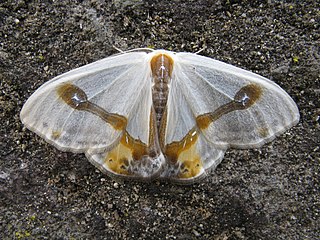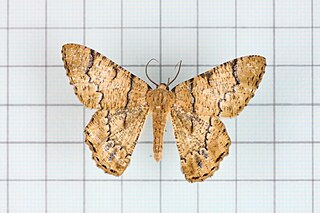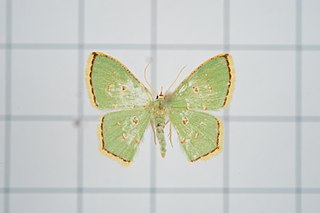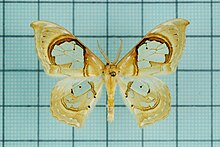
Drepaninae are by far the largest subfamily of the Drepanidae moths. While it is usually split into two tribes, Drepanini and Oretini, its internal systematics and phylogeny are not well resolved.

Arctornis l-nigrum, the black V moth, is a moth of the family Erebidae. The species was described by Otto Friedrich Müller in 1764. It is found in the Palearctic realm and Asia.

Brahmaea wallichii, also known as the owl moth, is a moth from the family Brahmaeidae, the Brahmin moths, and one of its largest species. It is found in the north of India, Nepal, Bhutan, Myanmar, China, Taiwan, and Japan. The owl moth is nocturnal. The wingspan is about 90–160 millimetres.

Paracolax is a genus of litter moths of the family Erebidae. The genus was erected by Jacob Hübner in 1825.

Evecliptopera is a monotypic moth genus in the family Geometridae described by Inoue in 1982. Its only species, Evecliptopera decurrens, first described by Frederic Moore in 1888, is found in northern India, Nepal, south-western China, Japan, the Russian Far East and Taiwan.

Euproctis insulata is a moth in the family Erebidae first described by Alfred Ernest Wileman in 1910. It is found in Taiwan.

Macrocilix mysticata is a moth in the family Drepanidae first described by Francis Walker in 1863. It is found in India, Myanmar, Taiwan, Japan and China.

Odontopera insulata is a moth of the family Geometridae first described by Max Bastelberger in 1909. It is found in Taiwan.

Ourapteryx nigrociliaris is a moth of the family Geometridae first described by John Henry Leech in 1891. It is found in China and Taiwan.

Lophophelma iterans is a moth of the family Geometridae first described by Louis Beethoven Prout in 1926. It is found in China and Taiwan.

Pareuchaetes insulata, also known as the yellow-winged pareuchaetes, is a moth of the subfamily Arctiinae. It was described by Francis Walker in 1855. It is found on Cuba and the Antilles, as well as in the southern United States, the Dominican Republic, El Salvador, Guatemala and Nicaragua.

Casminola yoshimotoi is a moth in the family Nolidae. It was discovered by Hiroshi Inoue in 2000. The moth is found in Taiwan and Thailand.
Meridemis insulata is a species of moth of the family Tortricidae. It is found in India.
Leucoblepsis fenestraria is a moth in the family Drepanidae. It was described by Frederic Moore in 1868. It is found in the north-eastern Himalayas, Taiwan and on Peninsular Malaysia and Borneo.
Macrauzata maxima is a moth in the family Drepanidae. It was described by Hiroshi Inoue in 1960. It is found in Japan and the Chinese provinces of Sichuan, Zhejiang, Yunnan, Hunan, Fujian and Jiangsu.

Macrauzata melanapex is a moth in the family Drepanidae. It was described by Hiroshi Inoue in 1993. It is found on Borneo, Sumatra and Peninsular Malaysia.
Macrauzata submontana is a moth in the family Drepanidae. It was described by Jeremy Daniel Holloway in 1976. It is found on Borneo, Peninsular Malaysia, Sumatra and Java.

Celenna festivaria is a moth of the family Geometridae first described by Johan Christian Fabricius in 1794. It is found in India, Sri Lanka, Myanmar, Borneo, Java Taiwan, the Ryukyu Islands and Luzon in the Philippines.

Comostola subtiliaria is a moth of the family Geometridae first described by Otto Vasilievich Bremer in 1864. It is a widespread species which is found in Korea and adjacent parts of Siberia, Japan, Borneo, Sumatra, India, South China, Taiwan, Borneo, Sumatra, and Sri Lanka.

Thalassodes intaminata is a species of moth in the family Geometridae, sometimes called emerald moths. It is found in Fujian China, Taiwan, Japan, Thailand, Philippines, and Indonesia (Sumatra). Until recently (2005) this species was classified as a subspecies of Thalassodes immissaria but has been upgraded to a distinct species. It is however very similar in appearance and distribution to T. immissaria, but can be distinguished by differences in male and female genitalia.
















